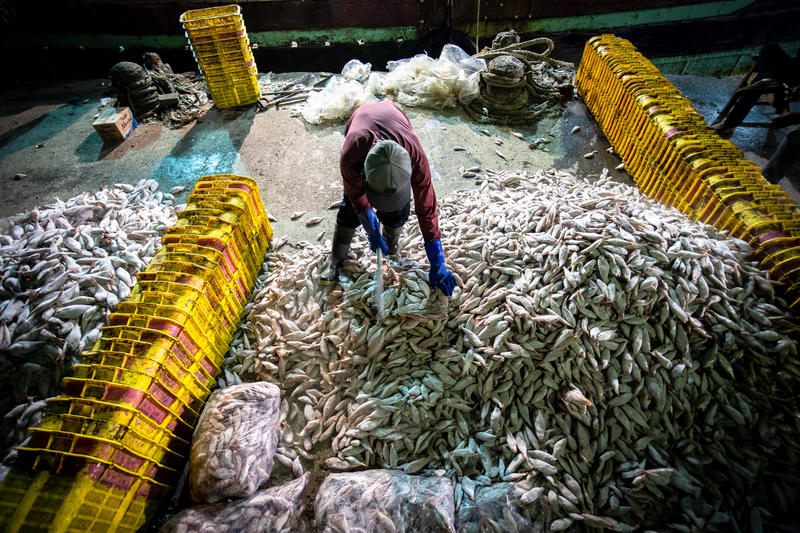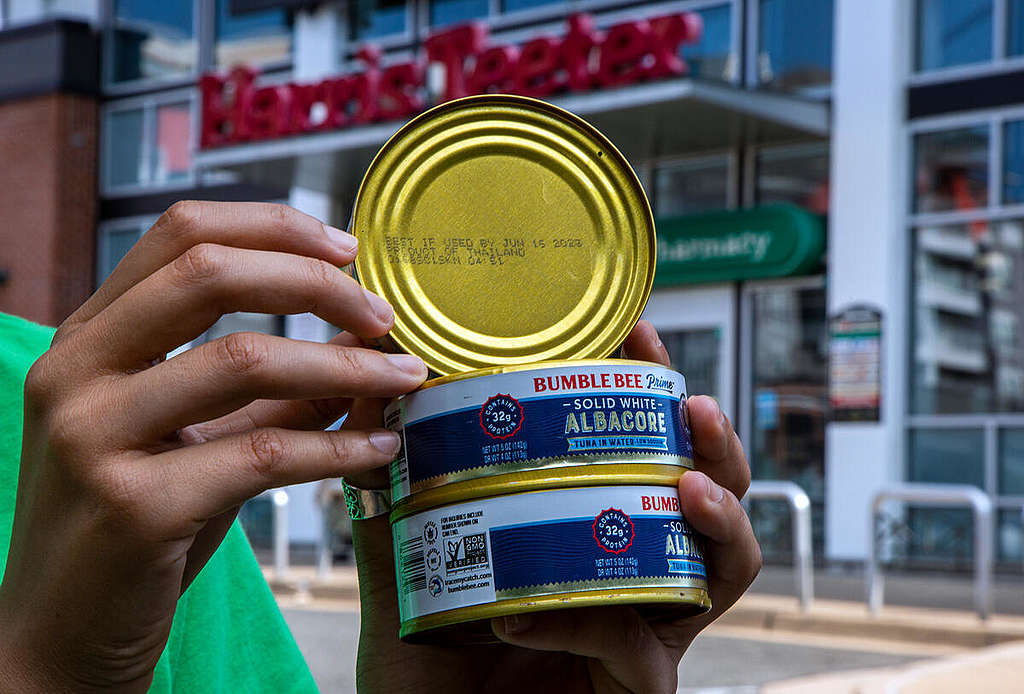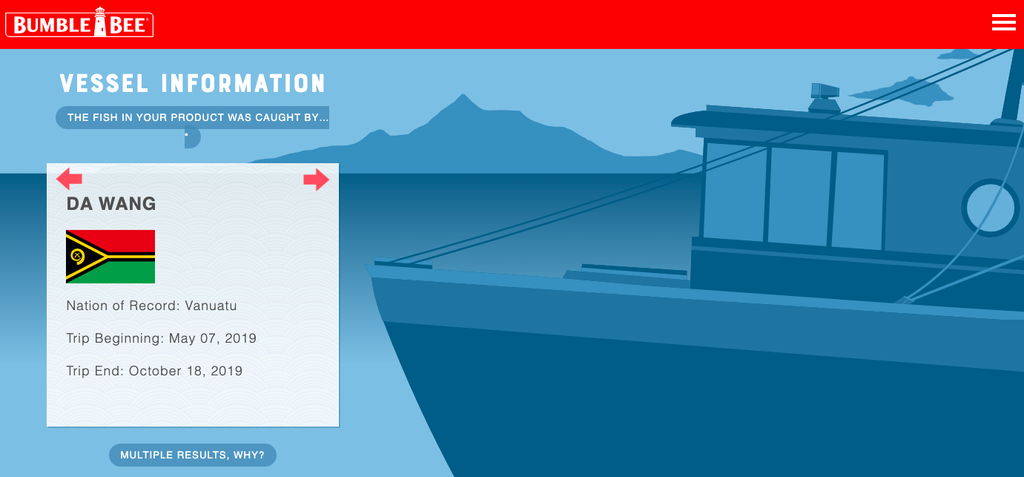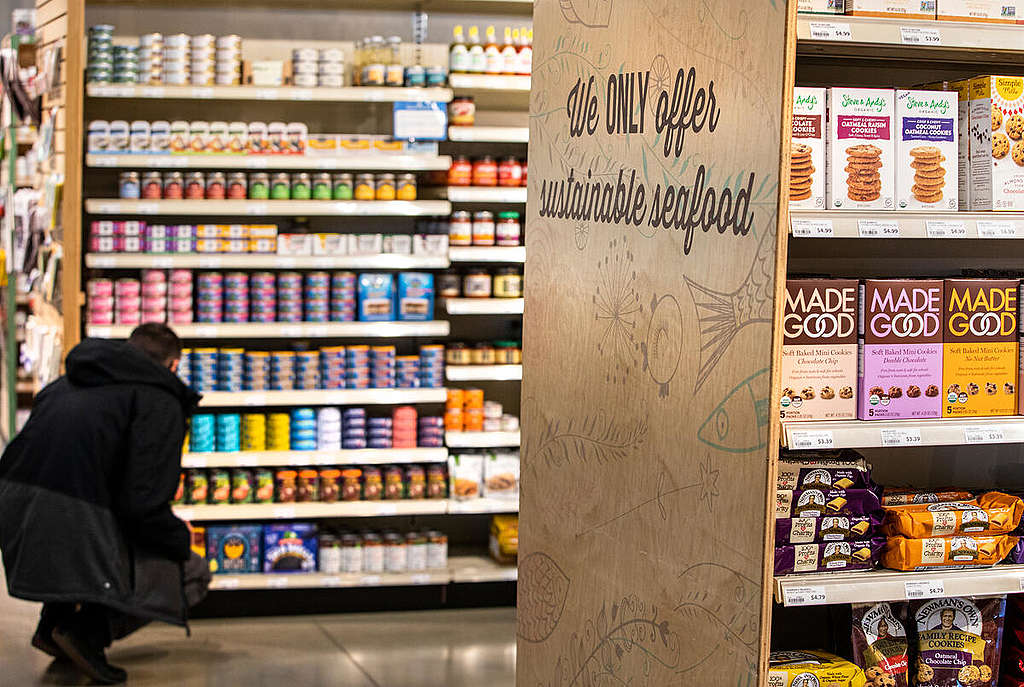Under the hot midday sun, Manny (not his real name) makes a plea for help.
"I am very weak right now and unable to breathe because I have asthma."
"Take a look. I live on a boat and it's very hot," he says in a video recording, lifting up a tarp he's using to shade himself and panning his mobile phone to show the vessel he's on. "In our cabin it's really hot and there isn't air-conditioning. So please help me, so that I can go to the hospital."
In 2019, Manny left the Philippines to work as a fisher on the Da Wang, a Taiwan-owned and Vanuatu-flagged high seas commercial fishing vessel. He hoped that this new opportunity would earn him enough to provide for his family. But instead of receiving a fair wage for his labour, he says he became a victim of human trafficking. During his time aboard the Da Wang he reports having witnessed his mates enduring physical abuse, with one incident being particularly brutal.
"The first mate in the captain's cabin would watch us work. If the first mate saw our now-deceased mate not working, or not working well enough, he would come down and start hitting him directly," he says solemnly.
Prosecutors found that a worker died after an accident in which he was hit on the back of his head. Although the cause of the death was found not to be directly linked, the accident prompted 19 foreign crew members to quit, reportedly because they couldn't stand the physical abuse they were subjected to aboard the ship.
The beginning of the seafood supply chain

For migrant fishers like Manny, this experience is unfortunately commonplace and is often where the tuna can's journey from sea to shelf starts. It's a vicious cycle: overfishing and depleted stocks over the past few decades now mean that vessels must venture further out to sea to make their catch; cheap labour is often employed to carry out the back-breaking work of setting and hauling in fishing hooks and lines; and on the vast high seas, beyond national jurisdictions, monitoring, and enforcement mechanisms, the isolated workers are often vulnerable and subject to abuse with very limited means to escape or report their experiences.
But over the years, an increasing number of news reports have documented how workers on distant water fishing vessels are being treated. According to various migrant worker groups and case studies, fishers have been subjected to human trafficking and forced labour, including financial exploitation such as debt bondage.
Knowing this, many companies now market their commitment to responsible and sustainable sourcing as much as they do the taste of their product. For groups, including Greenpeace, that have spent years monitoring and documenting human rights abuses in the seafood supply chain, it comes as no surprise that despite their claims and promises meant to instill consumer trust and confidence, for many seafood brands, that is not always the case.
Fake My Catch

An investigation by Greenpeace East Asia has found that at least one US brand, Bumble Bee, is shirking its commitment to environmental sustainability and human rights. In fact, the company's own transparency tool, Trace My Catch, which allows consumers to track where and how its tuna was caught, was found to be sometimes insufficient. In a sampling of 119 Taiwanese-flagged/owned vessels that supplied Bumble Bee, additional data showed that over 10% (13) had violated the Taiwan Fishery Agency regulations, and were on its illegal, unreported, and unregulated (IUU) list.
"Fake My Catch: the unreliable traceability in our tuna cans" report also unearths alarming information, which raises concerns that seafood tainted with forced labor has already been sold in the US market. A canned Bumble Bee product picked up at the American supermarket chain, Harris Teeter in Arlington, Virginia was found to have been sourced from the Da Wang. Bumble Bee's Trace My Catch website lists the source of this tuna as Da Wang on a trip in 2019, during which a fisher was reportedly beaten and died at sea. In April this year, the vessel's captain, first mate, and seven others were indicted by Taiwanese authorities for their involvement in forced labor and human trafficking.
Greenpeace East Asia's investigation also found that vessels had reportedly engaged in shark finning, illegal fishing, and had violated Taiwanese fishing regulations. Additionally, according to fishers that Greenpeace East Asia interviewed who worked on some of the vessels that were supplying Bumble Bee, they all worked overtime and had their wages withheld.
These findings contradict Bumble Bee's policies on corporate social responsibility and sustainability that are supposed to extend through its supply chain.

The "sustainable" choice

Bumble Bee wants us to believe that their products are healthy, nutritious, and, according to its new campaign, "good for you." But if alleged forced labour, illegal fishing, and other environmental and human rights abuses are happening in the seafood supply chain, is it really good for you?
Given the choice, most people would avoid seafood that came from overfished stocks, was caught illegally, or was caught by enslaved or abused fishers. For US consumers, a 2022 poll shows that almost three-quarters support traceability, or the ability to track seafood through the supply chain. Bumble Bee, one of the leading companies in the canned tuna market, and its Taiwanese parent company FCF, one of the top three global tuna traders, not only play an important role in the global tuna industry, but also over the health of our oceans and the lives of fishers at sea. As consumers and concerned individuals, what we need is a supply chain that is more transparent, and information that is comprehensive, correct and readily available. That truly would not only be "good for you" but good for the planet.
Yuton Lee is the Oceans Campaigner at Greenpeace East Asia (Taipei)






